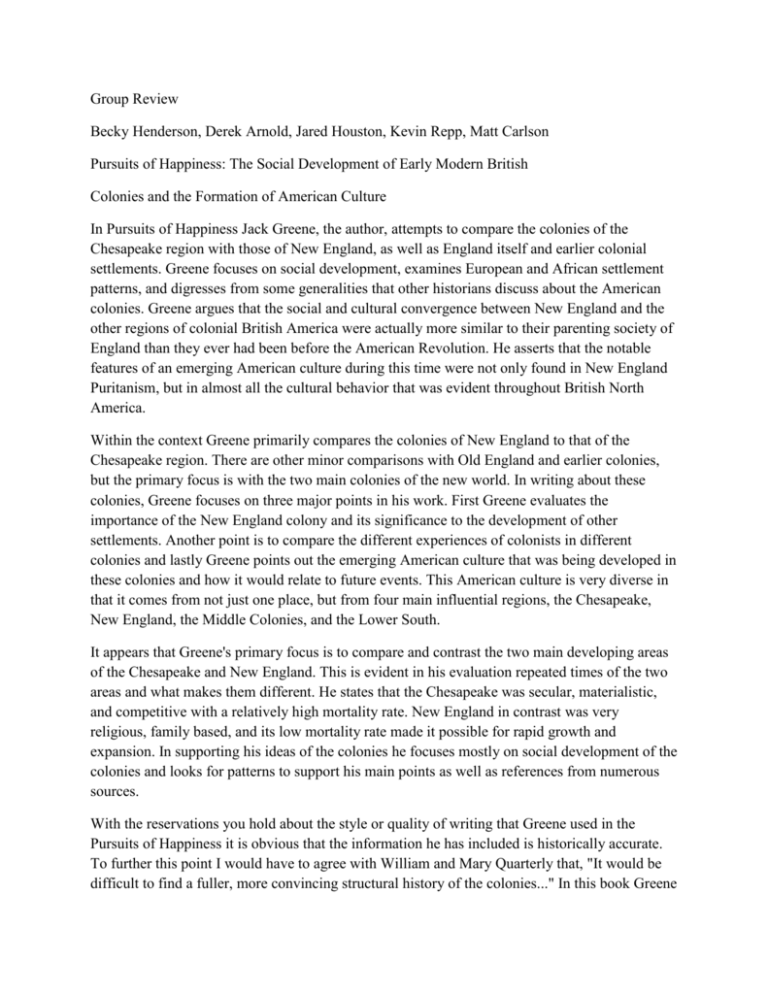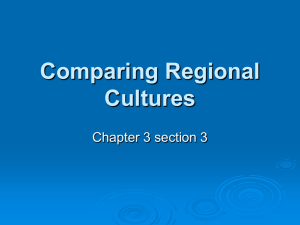Greene - Pursuits of Happiness group E
advertisement

Group Review Becky Henderson, Derek Arnold, Jared Houston, Kevin Repp, Matt Carlson Pursuits of Happiness: The Social Development of Early Modern British Colonies and the Formation of American Culture In Pursuits of Happiness Jack Greene, the author, attempts to compare the colonies of the Chesapeake region with those of New England, as well as England itself and earlier colonial settlements. Greene focuses on social development, examines European and African settlement patterns, and digresses from some generalities that other historians discuss about the American colonies. Greene argues that the social and cultural convergence between New England and the other regions of colonial British America were actually more similar to their parenting society of England than they ever had been before the American Revolution. He asserts that the notable features of an emerging American culture during this time were not only found in New England Puritanism, but in almost all the cultural behavior that was evident throughout British North America. Within the context Greene primarily compares the colonies of New England to that of the Chesapeake region. There are other minor comparisons with Old England and earlier colonies, but the primary focus is with the two main colonies of the new world. In writing about these colonies, Greene focuses on three major points in his work. First Greene evaluates the importance of the New England colony and its significance to the development of other settlements. Another point is to compare the different experiences of colonists in different colonies and lastly Greene points out the emerging American culture that was being developed in these colonies and how it would relate to future events. This American culture is very diverse in that it comes from not just one place, but from four main influential regions, the Chesapeake, New England, the Middle Colonies, and the Lower South. It appears that Greene's primary focus is to compare and contrast the two main developing areas of the Chesapeake and New England. This is evident in his evaluation repeated times of the two areas and what makes them different. He states that the Chesapeake was secular, materialistic, and competitive with a relatively high mortality rate. New England in contrast was very religious, family based, and its low mortality rate made it possible for rapid growth and expansion. In supporting his ideas of the colonies he focuses mostly on social development of the colonies and looks for patterns to support his main points as well as references from numerous sources. With the reservations you hold about the style or quality of writing that Greene used in the Pursuits of Happiness it is obvious that the information he has included is historically accurate. To further this point I would have to agree with William and Mary Quarterly that, "It would be difficult to find a fuller, more convincing structural history of the colonies..." In this book Greene went to great lengths to examine every aspect of social and cultural life in the Chesapeake region. He starts with the classic models of English colonization and then deeply analyses the colonial lifestyles in the 1600 and 1700's. To look at the historical accuracy of Greene's book we have to look at the resources he used to write it. With about a quarter of a page of citation per page he definitely did his homework. He looked deeply into the formation of the American culture and developed a historically accurate work to convey his points. I believe that he may have been too worried about cramming so much historical evidence into this book that he neglected the flow and readability. The first is a question of the author's voice or lack thereof. The book certainly has a "veritable mountain of scholarship" but very little of the author's actual opinions are mentioned apart from a very brief prologue. The many references by scholars certainly gives the book credibility, but they also cause the author to appear detached and unsure of his own opinions, which brings up another issue with Greene's book: the author seems unsure of his own opinions. His thesis is clear enough but throughout the book it becomes more unapparent why he feels this is important. Is he trying to exonerate the stigma of the south and their aristocratic landholders? Is he condemning both the north and south for fighting the bloodiest war in American history when both sides were more alike than they imagined? Or does he just think it's an interesting point? Whatever Greene's reasons behind writing the book, they are not made clear on its pages. Finally, the book itself is entirely impersonal. With mountains of scholastic essays and literature to draw from, Greene never once speaks outside of the vastly general. When he talks about the decline of Puritan New England, the reader has to take his word for it as he gives no examples and offers no primary documentations of the events that he is discussing. This makes the book dry and ineffective. In conclusion, Jack Greene's Pursuits of Happiness leaves something to be desired. Though informing and historically accurate, the amount and quality of reflection and personal research seems to be lacking. Greene relies heavily on the work of other authors and historians for his research, negating a certain level of credibility that many authors carry through extensive research and reflection. The fifty-four pages of notes and references don't help, and instead of creating an air of well-backed research, makes reading Pursuits of Happiness a tedious task of toand-fro flipping and tenuous spare research to establish credibility. Greene's conclusion that each style of early-American colony cycled towards the tendencies of others in time, though seemingly sound, may not have warranted the authorship of another history on early American colonies and their development. His comparisons to other colonies, such as those of the Bahamas and West Indies, establish only his knack for comparative research as opposed to reflective. Valuable information concerning the differences and similarities of the Chesapeake Bay and New England colonies is available, but reflection concerning the importance, just as so much else in Greene's work, is not.









